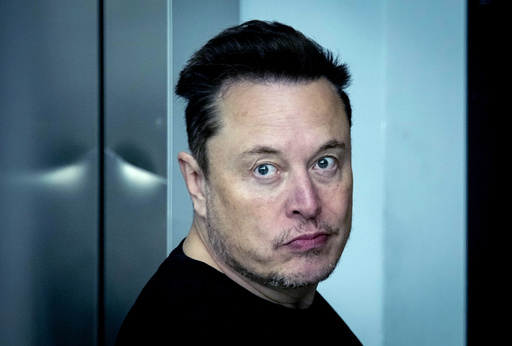DETROIT (AP) — If Tesla shareholders vote against restoring Elon Musk’s $44.9 billion pay package Thursday, the CEO could deliver on threats to take artificial intelligence research to one of this other companies. Or he could even could walk away.
If they approve the all-stock compensation package that was thrown out by a Delaware judge in January, it would almost guarantee he would remain at the company he grew to be the world leader in electric vehicles, shifting to AI and robotics including autonomous vehicles, which Musk says is Tesla’s future.
But even with reapproval at Thursday’s annual shareholders’ meeting, which many analysts say is likely, there would be uncertainty. Musk has threatened on X, his social medial platform, to develop AI elsewhere if he doesn’t get a 25% stake in Tesla (He owns about 13% now). Musk’s xAI recently received $6 billion in funding to develop artificial intelligence.
Wedbush Analyst Dan Ives said he expects the package to be overwhelmingly reapproved, ending a lot of uncertainty with Musk. “This issue has been an overhang on Tesla’s stock, and this will be important to move this distraction in the rearview mirror,” Ives wrote in a note to investors.
Shares of Tesla Inc. have slumped more than 30% this year with the company warning of “notably lower” sales growth this year.
Also on the shareholder ballot is the related issue of moving the electric vehicle maker’s legal home out of Delaware to Texas.
The move is designed to escape from the Delaware court’s oversight and possibly a ruling from Chancellor Kathaleen St. Jude McCormick that invalidated Musk’s pay package. In a January opinion on a shareholder lawsuit, the judge determined that Musk controlled the Tesla board and is not entitled to the landmark package once worth nearly $56 billion.
Multiple institutional investors have come out against that sizeable payout, some citing falling vehicle sales, price cuts and the tumbling Tesla stock price. But Tesla’s top five institutional shareholders, Vanguard, BlackRock, State Street, Geode Capital, and Capital Research either said they don’t announce their votes or wouldn’t comment. They control about 17% of the votes.
Erik Gordon, a business and law professor at the University of Michigan, said individual shareholders are likely to vote for the package, and they own more than half of Tesla’s shares.
One investor who came out against the package is Norway’s sovereign wealth fund operated by Norges Bank Investment Management. It said last weekend that it would vote no on Thursday.
“While we appreciate the significant value generated under Mr. Musk’s leadership since the grant date in 2018, we remain concerned about the total size of the award, the structure given performance triggers, dilution, and lack of mitigation of key person risk,” Norges Bank Investment Management said in a prepared statement.
In May, two big shareholder advisory firms, ISS and Glass Lewis, recommended voting against the package.
But Tesla and Musk have unleashed a furious lobbying effort to get the package approved, in posts on X, television appearances and in proxy filings with the U.S. Securities and Exchange Commission.
“Only 2 days left to protect & help grow the value of your investment in $TSLA by voting FOR ratification of the 2018 CEO Performance Award,” Tesla posted on X early Tuesday.
Tesla Chairwoman Robyn Denholm, in a letter to shareholders, wrote that the package was approved by 73% of the vote six years ago. “Because the Delaware Court second-guessed your decision, Elon has not been paid for any of his work for Tesla for the past six years that has helped to generate significant growth and stockholder value. That strikes us — and the many stockholders from whom we already have heard — as fundamentally unfair, and inconsistent with the will of the stockholders who voted for it,” she wrote.
Tesla has said the 2018 award incentivized Musk to create over $735 billion in value for shareholders in the six years since it was approved.
Source: post





